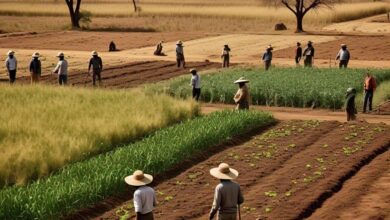The Impact of Climate Change on Zimbabwe’s Agricultural Education

Zimbabwe’s agricultural sector is undergoing significant transformations. Climate change is playing a central role in this transformation. The impact of climate change on Zimbabwe’s agricultural education is undeniable and institutions must reassess long-established training models.
Firstly, educators must incorporate climate-resilient practices into curricula to equip future farmers with innovative techniques. Moreover, shifts in weather patterns should compel a swift transition to adaptive teaching methods.
Climate Impact on Zimbabwean Agri-Training: Innovative Curriculum Adjustments
Also, educational institutions embracing modern pedagogical strategies to counteract climate uncertainties will fare better in the future of agricultural education. For example, an emphasis on the importance of field-based learning and real-time data analysis will propel future graduates to help farmers and those in the agricultural field.
Furthermore, researchers and policymakers alike must not that the impact of climate change on Zimbabwe’s agricultural education demands curriculum adjustments that merge traditional farming knowledge with modern science.
Consequently, students gain firsthand experience through practical simulations and therefore benefit from expert guidance via partnerships with reputable organisations such as the UN CC: Learn. Additionally, platforms like SpringerLink can provide scholarly insights that drive continuous innovation.
Environmental Challenges in Zimbabwe’s Agri-Education: Adapting to Extreme Climates
Simultaneously, climate-induced challenges such as erratic rains and prolonged droughts redefine educational priorities. As a result, the approach to agriculture education must now include robust risk management training. In this section, the impact of climate change on Zimbabwe’s agricultural is evident. Therefore, learning institutions should adjust accordingly.
Furthermore, advanced research work, supported by organisations like FAO, offer guidance on drought resistance and soil conservation. In addition, educators should emphasise the need for sustainable practices, thereby inspiring both students and professionals to remain focused on long-term adaptation strategies.
Sustainable Agri-Education Amid Climate Change: Integrating Technology and Community Engagement
Furthermore, technology and community partnerships are vital for bringing forth solutions. Enhanced digital platforms can allow virtual field trips and remote data gathering, ensuring that practical learning remains uninterrupted.
Here, the impact of climate change on Zimbabwe’s agricultural education can be mitigated by integrating climate-smart tools into everyday lessons.
Moreover, community engagement fosters local innovations that are both practical and sustainable. Consequently, students can learn not only through textbooks but also via real-life applications, which, in turn, build regional resilience.
Zimbabwean Farming Education Transformation: Local Initiatives and Global Partnerships
Additionally, local institutions can invest heavily in transforming their teaching methods to meet modern challenges. In many cases, these transformations stem from cooperative projects with international agencies.
Indeed, the impact of climate change on Zimbabwe’s agricultural education can be addressed through initiatives that blend theory with practice. For instance, initiatives that promote water-harvesting techniques and drought-resistant crops can make a substantial difference.
Also, these projects can be supported by global institutes like FAO, ensuring that students receive a well-rounded education.
Climate Crisis in Zimbabwean Agriculture Education: Policy Reforms and Future Outlook
Policy reforms should be at the forefront, as government agencies work to bolster support for adaptive education models. The impact of climate change on Zimbabwe’s agricultural education should lead to advocacy for funding research that bridges academic instruction with practical fieldwork.
Consequently, educators can collaborate closely with policymakers, ensuring that training programs are responsive to the evolving climate crisis. Meanwhile, investments in technology and sustainable initiatives can also receive attention.
Adaptive Agri-Training in Zimbabwe: Enhancing Resilience Through Innovation
Ultimately, institutions must become more agile, blending innovative techniques with time-honoured practices. As a final note, the impact of climate change on Zimbabwe’s agricultural education is a catalyst for significant change, driving forward initiatives that emphasise both adaptability and resilience.
In summary, by harnessing modern technology, proactive community engagement and comprehensive policy reforms, Zimbabwean agriculture education can look forward to a future grounded in sustainability and innovation.





